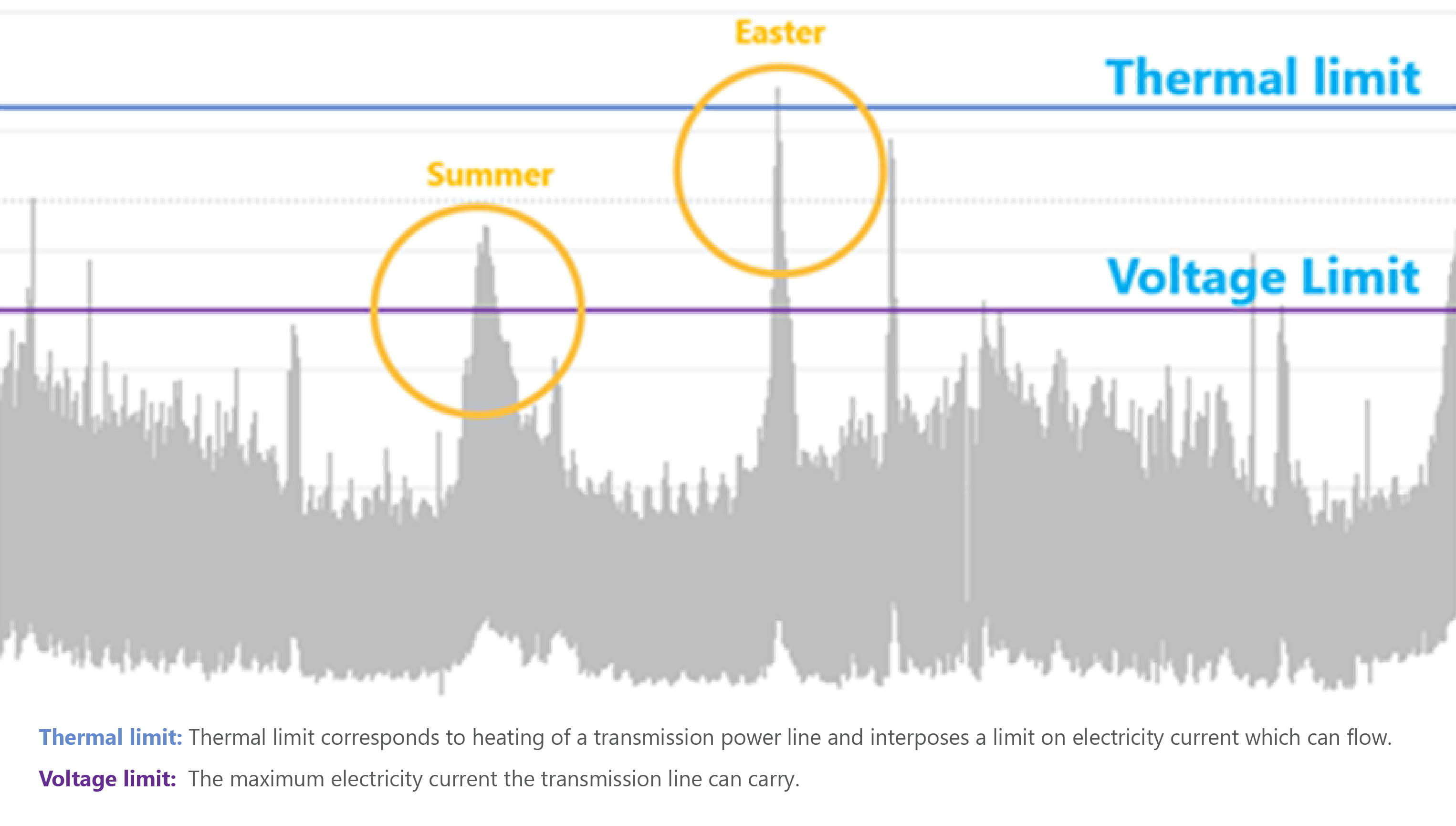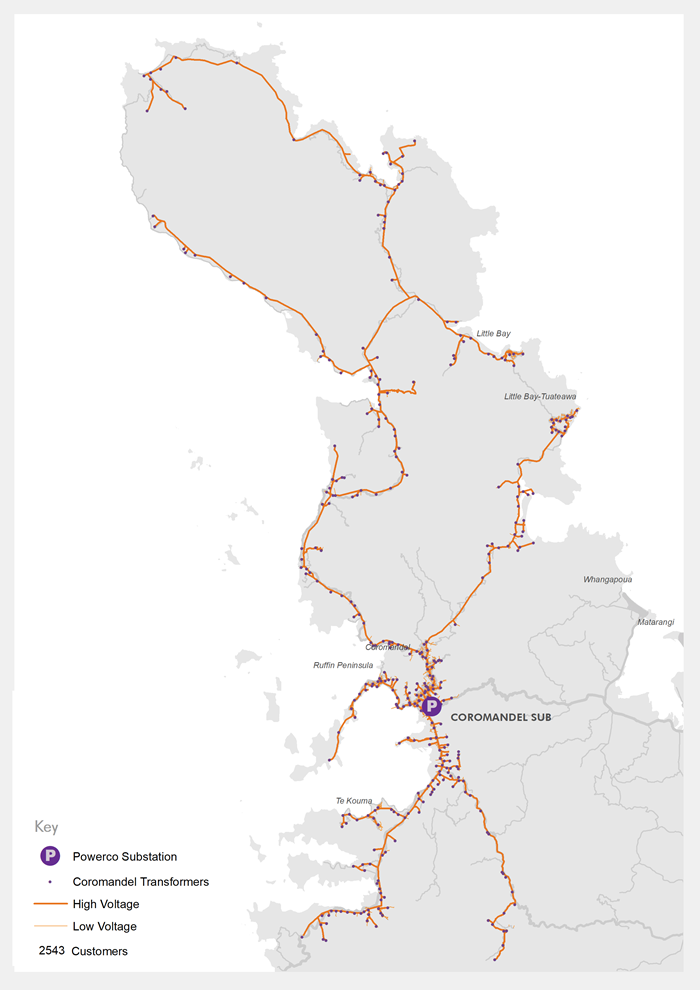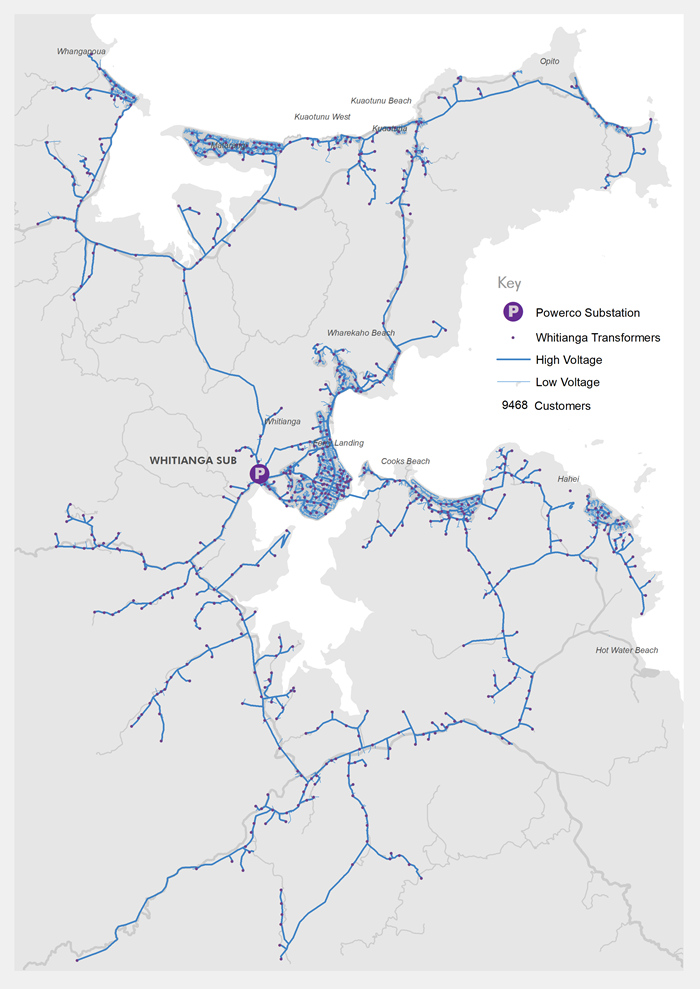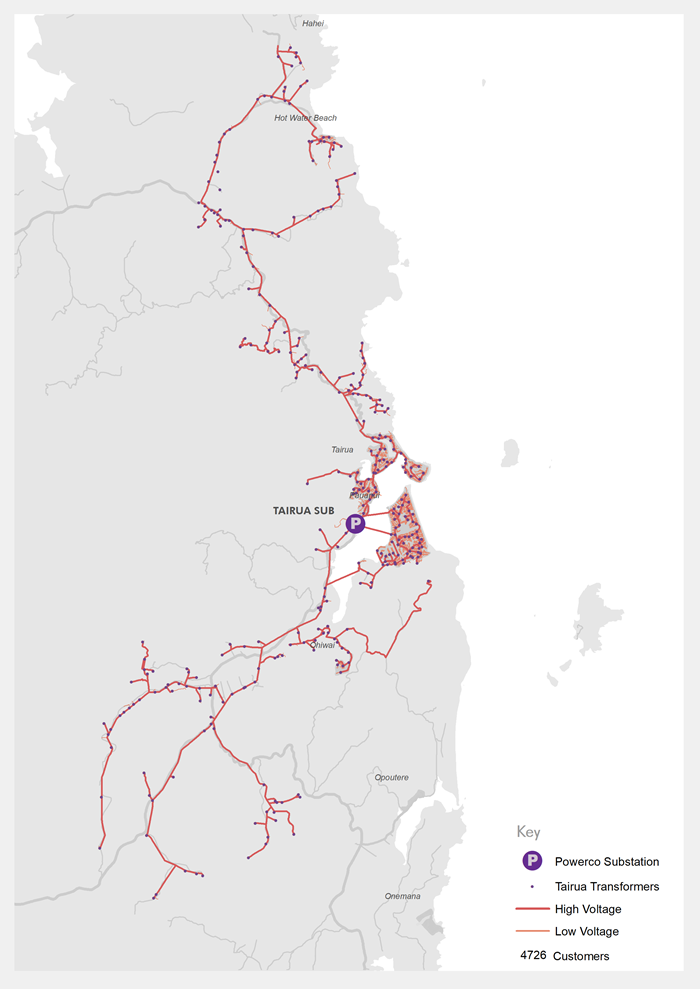Coromandels power supply
Consultation closed on 2 May 2021
With more people choosing to live and visit the Coromandel region, comes a much greater demand for power. This means there are now times during the year – mainly public holidays and long weekends – when the level of demand is greater than our network was originally designed to deliver.
There’s now a chance of losing power during these times of peak demand, and this will increase as the region’s electricity demand continues to grow.
We know that there’s never a good time to be without power. That’s why we’re working towards a solution that will support your community’s power supply into the future, peak times included.
Back in 2017, our team considered options and identified that a traditional approach, which would involve building new overhead power lines to increase the capacity of our existing network, would address the issue.
The timing is now right to address the issue and we want to ensure that it aligns with your community’s priorities, particularly given there are other options available, which don’t necessarily involve putting up more poles and wires. From our discussions with the communities we serve over the last few years, we believe that customers want the lowest cost solution, that in addition meets reliability expectations and has the least impact on the environment.
If these priorities are shared by the Coromandel community, there is an alternative to a traditional (poles and wires) approach. This is the installation of modern diesel generators in three site locations: Whitianga, Matarangi and Coromandel Town. These would provide a back-up supply that will kick into action to keep the power on, but only in the event it is needed. In fact, the total time the diesel generators would be expected to run for the three areas is a maximum of eight days. This means the environmental footprint is low and can be installed quicker than other available options.
Using this type of generation means we can continue to deliver a safe and reliable power supply to your community at the lowest cost to you.
While we believe that diesel generators are the best option from a cost, reliability and environmental perspective, we’re continuing to explore other alternatives at the same time. This will make sure we deliver the solution that best meets these needs.
Keep updated
If you’d like to receive email updates about this project complete the form below.
Coromandel FAQs
We’re investing in the Coromandel region to improve the reliability of power supply to the community now and into the future. Geographical challenges and the fact there are times during the year when the level of demand for power is greater than our network was originally designed to deliver, means residents and businesses can experience power outages.
We understand the disruption outages cause and the risk of losing power during these times of peak demand will increase as the region continues to grow.
When there’s an influx of visitors to the region. This is mainly during long weekends, public holidays, and other times of the year when people take a break such as the Christmas/New Year holiday period and Easter.

Our investment will improve the reliability of power supply to those located in the areas on the map below:

Whitianga
9,468 customers

Tairua
4,726 customers

There are several ways to address the issue from an engineering perspective.
Back in 2017, as part of our five-year investment programme, our team considered options and identified that a traditional approach, which would involve building new overhead power lines to increase the capacity of our existing network, would address the issue.
Since then, our thinking has evolved and we’re considering alternatives in line with feedback we’ve received from customers previously across four key themes including:
• Reliability of supply
• Investment cost
• Environmental impact
• How soon it can be delivered
What can be delivered sooner, keep costs down for our customers, minimise environmental impact and improve the reliability of power supply.
The solution most closely aligned with the priorities of our customers involves the installation of modern diesel generators in three site locations: Whitianga, Matarangi and Coromandel Town. This would provide a back-up supply that will kick into action to keep the power on, in the event it is needed.
We’re also continuing to explore what other options are available for providing additional supply during times of peak demand so that we can assess these as part of our decision-making process. This is to ensure we deliver the solution that best meets the needs of your community.

Initially, this was the thinking we built into our five-year investment programme; however, we have revisited our approach largely due to the associated costs, which are then passed back to our customers through the distribution part of their power bill.
The Coromandel region is a beautiful part of our network, but there are significant challenges posed by the terrain, which translates into significant costs when building poles and wires.
Added to this, because the population fluctuates so much between the quiet periods and times when people visit the region for a holiday, we realise that a new permanent supply isn’t the best solution. With the use of modern diesel generators for example, we can install a back-up supply that will kick into action only when needed, therefore limiting the impact on our carbon footprint.
The geography of the region presents challenges posed by the rugged terrain, and this translates into significant costs when building poles and wires. Finding a more cost-effective solution is important as these costs are passed back to customers through their power bill.
The timing of the peak demands being over the Christmas period and other public holidays is when there is a significant increase in the population on the Coromandel peninsula and consumers most want to have access to a reliable power supply. This presents challenges in getting enough electricity users to reduce their loads enough to have the impact required to avoid a loss of power supply.
Over the years, customers across our network have said they want a reliable network, with minimal environmental impact that can be delivered in time to address the risk of increased outages, and at the lowest cost.
We’re carefully considering options that will improve the reliability of power supply to your community into the future.
The generators would be used to provide a back-up supply, kicking into action only when needed during times of peak demand.
We estimate that the total time the generators would be used is the equivalent of up to eight day a year across all three sites.
This means the carbon footprint is low as they’re only generating power to support the network at peak times, when needed.
The flexibility that the modern generator option provides is that they can be scaled up or down or removed, as needed. We continue to review and project future demand and believe the proposed generators would be large enough to meet needs. With the development of new technology, and growing uptake of residential solar and/or battery solutions, we may no longer require generators to support the network in the future.
Based on your feedback, we’re currently exploring this option.
We’re committed to helping New Zealand move towards a zero emissions future and achieve its zero-carbon goal. One of the significant challenges we face when making decisions that have an environmental impact, is getting the balance right between the reliability of supply that our communities desire and the financial cost, to provide a network that can deliver.
July 2020, we asked our stakeholders to participate in an assessment to inform us on which sustainability issues were most important to them and to understand Powerco’s impacts. We have set a target for 2030 of zero in our scope of emissions, including any emissions from generator use. Click here to read Sustainability at Powerco.
From the feedback received it was questioned as to why we are not looking at new technologies to supply the community through the peak periods, when it is required. We have extensively explored the use of large scale solar and batteries as a solution option. Either would be capable to address the peak demand issue we are looking at addressing, however the cost of these technologies is significantly higher (more than $10 million) than the alternativegeneratorsolution.
As the Coromandel peninsula community will experience a price increase in the distribution component of their bill, which feedback has told us customers want to minimise, generators provide the most balanced solution between price increase, reliability, and environmental impact. We’ll continue to investigate the energy market to look for opportunities where we can offer a balanced solution.
We are continually exploring ways to encourage customers to adopt new technologies that will meet their energy needs, support the decarbonisation of New Zealand, and reduce investment on the network to meet peak demand. The size of the current peak demand issue and the need to address it in a timely fashion doesn’t make small scale residential generation a feasible option with the uncertainties around what the uptake would be.
Wind turbines and solar arrays come at a high cost. Even if technically possible, the cost and complexity would far outweigh the benefits for the Coromandel peninsula when addressing the current electricity peak demand challenges.
Even if technically possible, the cost and complexity of developing small scale hydro-power dams or geothermal generation would far outweigh the benefits for the Coromandel peninsula when addressing the current electricity peak demand challenges.
The proposed alternative solution of diesel generators is a medium-term solution to secure the reliability of power supply during peak times. When it is needed to kick in, across the three sites the running time will be approximately 8 days annually over the three sites. The team at Powerco are committed to provide a long-term solution and this will be included in our forward planning strategy.
The speed of change in electricity generation technology means there is higher risk at this time of developing a new distribution network at a high cost. A medium-term lower cost option allows us to better understand the speed of change in technology and how communities want to generate and use electricity while meeting current reliability and resilience challenges.
As a regulated business, the cost of maintaining and enhancing the performance of our network is passed back to our customers through your retailer on your power bill. This means we need a solution that is cost-effective.
To help give you an idea of how your bill may be impacted, we’ve estimated the increase in distribution charges that will take affect from March 2023.
Although this is based on moving forward with modern diesel generators (if this aligns with your priorities as a community), it provides a better understanding of how your prices may be affected. The impact on your electricity bill will depend on your circumstances and how your retailer chooses to repackage these changes for you.
- For our residential customers, we estimate an increase of between $2.15 and $3.50 per month.
- For our commercial customers, our modelling suggests an increase of between 4% - 7.5% of the distribution charge indicated on your bill.
The amount you are charged for your electricity is dependent on several factors and is made up of the cost to generate, distribute and retail your electricity. The distribution part of your bill, which Powerco looks after, makes up about 30% of your total bill.
The increased costs that are incurred to improve the reliability of your power supply are passed back to customers through their power bill. That’s why we carefully consider to balance the cost of the investment alongside reliability of supply. An increase in the need to recover costs for any project to improve the reliability and resilience of the solution over the life of the project will need to come from our customers in the Coromandel.
Yes. Using localised generation reduces the points of failure in transportation of electricity via distribution lines, particularly in challenging environments like the Coromandel. Installing generators near larger towns would significantly increase the chances of keeping power on to smaller e communities in the event there’s a disruption in supply damage occurs to the lines downstream.
We’re in the early stages of this project. As a first step, we’re workedthrough ensuring that we deliver the solution that best meets the needs of your community and aligns with your priorities and values.
We explored other alternatives to ensure we’ve considered all the options that meet the criteria of low cost, high reliability, timeliness, and low environmental impact.
If it’s confirmed that the installation of modern diesel generators is the best option based on your feedback and our comparison with alternatives, this will take up to 1 to 2 years to deliver. We’ll keep you updated regularly as we progress.
The generation will help to relieve constraint on the 11kV network mainly during peak periods when Matarangi is back feed from the Kuaotunu feeder. Secondly, to help relive constraint on the 66kV Subtransmission network during an outage on the Subtransmission loop circuit during peak periods.
To ensure that we deliver a solution that reflects the priorities that matter most to those that live in the Coromandel, we asked for your feedback in April 2021 to help us understand what is important to you. Thank you, we received a great response and will incorporate your feedback into our solution review process. Concerns or questions that were raised through your feedback we have outlined and answered within these FAQs.
As well as talking to you, we’re talking with retailers, engaging with representatives from Thames-Coromandel District Council, Iwi, and other key stakeholders within your community. To ensure they are all well informed and can share their views, as well as helping us raise awareness and communicate our progress along the way.

